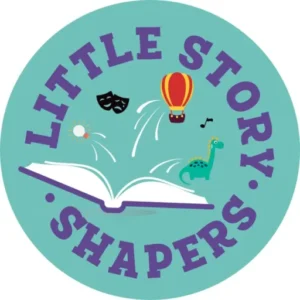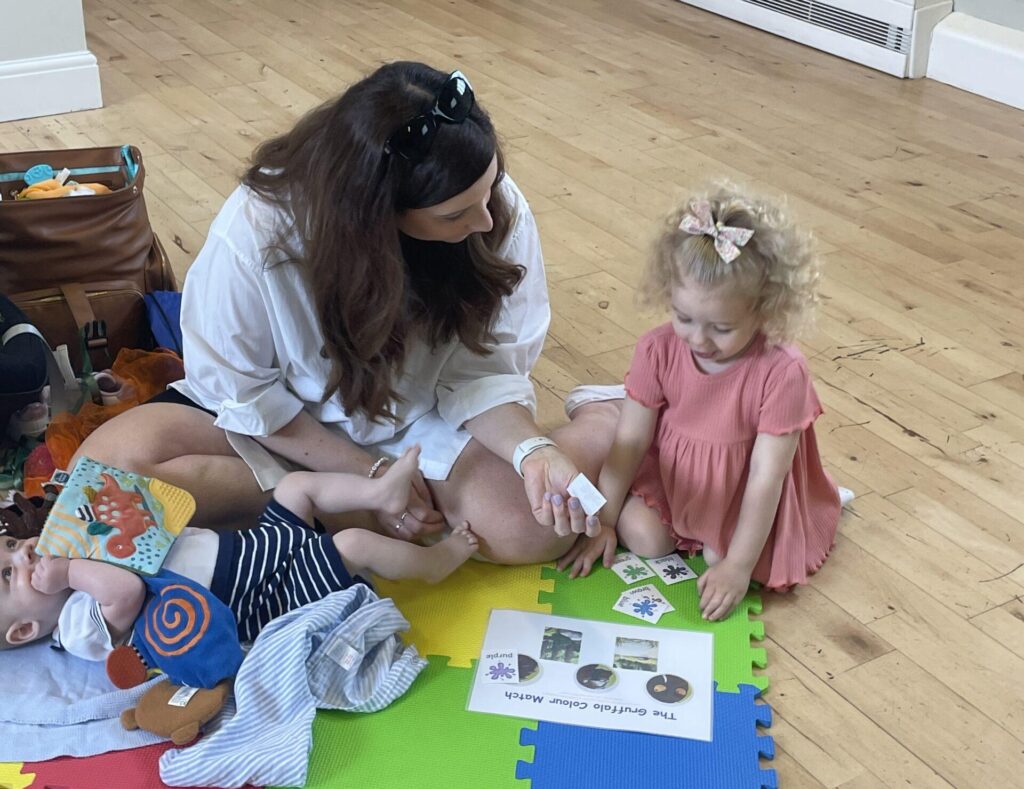Helping your child learn to read starts long before they pick up a pencil or sound out a word. In fact, some of the most powerful learning happens through play, conversation, stories, and imagination. That’s where Phase 1 Phonics comes in — the very first step in teaching children how to listen, speak, and get ready to read.
If you’re a parent or carer looking for baby and toddler classes in Essex that support early language and literacy skills, understanding Phase 1 Phonics is a fantastic place to start. This essential foundation helps children under 5 develop listening, speaking, and sound awareness — long before they start reading on the page.
I am really passionate about supporting little ones with these skills as it sets them up for success. Phases 1 Phonics skills are carefully woven into all our classes often without you even realising, from our youngest babies right up to our 4 year olds. We are shaping their early communication skills from the very beginning.
A Speech and Language teacher said to me; “I absolutely love your classes because it’s so important to help children from an early age with these language skills. You skilfully weave language into all your activities which is so amazing to see.”
I’ve created this guide to help you understand the 7 stages of Phase 1 Phonics, and give you easy, fun activities using books and drama that support each stage.
What is Phase 1 Phonics? And How Can You Help by Using Books and Drama?
Phase 1 focuses on developing a child’s listening and speaking skills. These are essential foundations for reading and writing. It’s divided into 7 key aspects, all designed to help children tune into sounds, remember them, and start to produce them.
If you’re attending our Little Story Shapers, baby and toddler classes in Essex already, then you’re already supporting Phase 1 learning without even realising it!
Whether you’re a parent at home or looking for baby and toddler classes near Chelmsford, Braintree or Witham, try these playful activities to help your child develop their early sound awareness and join us in class to further support their development. .
???? Phase 1 Phonics – Aspect 1: Environmental Sounds
Goal: Help your child notice and identify sounds in the world around them.
Activity with Books & Drama:
•Story Suggestion: We’re Going on a Bear Hunt by Michael Rosen. As you read, dramatise the sounds — “swishy swashy” grass or “squelch squerch” mud. Pause and let your child make the sounds with you.
•Drama Play: Take a “sound walk” like the family in the book. Pretend to explore different places and create sound effects with your voice or props (e.g. tapping on boxes, shaking rice in a jar).
????️ Phase 1 Phonics – Aspect 2: Instrumental Sounds
Goal: Distinguish between different sounds made by instruments or everyday objects.
Activity with Books & Drama:
•Story Suggestion: Giraffes Can’t Dance by Giles Andreae. Make musical instruments from household items (shakers, pots, spoons) and play along with the rhythm of the story.
•Drama Play: Pretend you’re animals in a jungle band. Take turns being the “conductor” and leading different sound patterns.
We bring this story to life in class during our music-based baby and toddler classes and I love to see all the children exploring the different sounds instruments make.
????️ Phase 1 Phonics – Aspect 3: Body Percussion
Goal: Recognise and create sounds using the body — clapping, stamping, tapping.
Activity with Books & Drama:
•Story Suggestion: Shake My Sillies Out by Raffi. It’s great for body movement and rhythm.
This song is a firm favourite in our movement classes for preschoolers as we dance around with pom poms to strengthen muscles ready for writing.
•Drama Play: Create a “sound dance” where you stomp for a bear, clap for a bird, or snap your fingers for a sneaky fox. Let your child invent their own sound moves for characters.
???? Phase 1 Phonics – Aspect 4: Rhythm and Rhyme
Goal: Tune into the rhythm and rhyme in speech and stories.
Activity with Books & Drama:
•Story Suggestion: Each Peach Pear Plum by Janet and Allan Ahlberg or Room on the Broom by Julia Donaldson. Point out rhyming words and let your child guess what might come next.
•Drama Play: Act out rhyming stories or make up your own silly rhymes for characters (“The cat wore a hat and sat on a mat!”).
???? Phase 1 Phonics – Aspect 5: Alliteration
Goal: Notice when several words start with the same sound.
Activity with Books & Drama:
•Story Suggestion: The Gruffalo by Julia Donaldson or Fox’s Socks by Julia Donaldson (part of the Tales from Acorn Wood series).
•Drama Play: Play “sound shopping” — “I’m going to the market to buy…” and choose items that start with the same sound (e.g., “slippery socks, squishy squids”). Dress up or role-play shopping.
We love bringing this book to life in our baby and toddler classes in Essex as we head off on an imaginative adventure into the deep, dark wood.
???? Phase 1 Phonics – Aspect 6: Voice Sounds
Goal: Explore how we can change our voices to make different sounds and meanings.
Activity with Books & Drama:
•Story Suggestion: The Very Hungry Caterpillar by Eric Carle — use a different voice for each food or day of the week.
•Drama Play: Pretend to be different animals or characters — a roaring lion, a squeaky mouse, a robot. Use mirrors and microphones (real or pretend) to see and hear how your voice changes.
I love using my voice in class and supporting parents with using their voices too so they can engage and interact with their baby during our sensory classes.
???? Phase 1 Phonics – Aspect 7: Oral Blending and Segmenting
Goal: Begin to put together and break down sounds in words, a key step toward reading.
Activity with Books & Drama:
•Story Suggestion: Any familiar book with short, simple words. Choose words to segment: “Let’s say ‘dog’ in sounds — d-o-g!”
•Drama Play: Play “robot talk” games. Say words in broken sounds (“Can you find the c-u-p?”) and act out bringing the items or using them in pretend play.
Final Tips for Parents with Under 5’s:
•Keep it playful. Children learn best through fun and repetition.
•Be a model. Join in, be silly, and exaggerate sounds and expressions.
•Revisit stories. Repeating books helps children pick up patterns and sounds.
•Praise effort, not correctness. Celebrate every attempt — it builds confidence.
Reading and storytelling don’t just help with phonics — they help your child build imagination, empathy, vocabulary, and confidence. Combine books with movement, drama, and sound games, and you’re giving your child the best possible start to reading.
All our classes shape children’s early communication skills. Interested in joining? Check out our classes page here:


